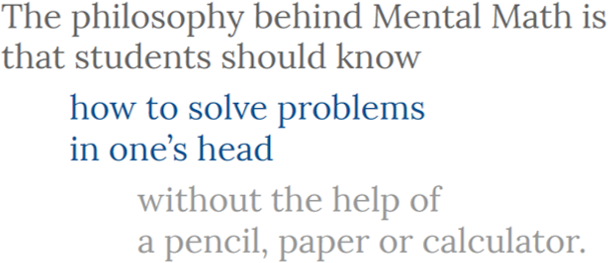The purpose of this article is to discuss the philosophy behind Number Sense and Mental Math, why it is an important part of learning math, how it supports problem solving, and how you can help your child improve their sense of numbers.
What is Mental Math

Mental math and number sense are practical skills that help us solve problems with speed and accuracy.
Why Mental Math matters?
Mental math is a practical skill that we use on a daily basis
(e.g. Counting change from a cashier, estimating time to reach a destination, checking the reasonableness of a number on a report or an answer on a test. )
Certain problems can be solved faster in our heads
(e.g. 88 + 28 + 12 is solved in seconds using mental math skills.)
It encourages a deeper understanding of numbers. Solving problems mentally pushes us to surface relationships and patterns that exist in numbers. We call this Number Sense. A learner with number sense will look at a number, such as 16, and see it as four sets of four, as two digits – 1 and 6, as a 10 and a 6, as 42, as 10(base 16), as 1000(base 2), also known as binary, as 24, as 2x2x2x2. This mathematical dexterity enables the learner to choose the best representation that fits the problem and solves the problem with greater speed and accuracy.
We avoid hard work, transforming some of the tedium in math into much easier approaches, leaving more time to focus on other aspects of problem solving.
It is proven that we become faster and more adept with problem solving when we mentally perform calculations.
Practicing mental math drills is also a good way to keep math concepts fresh in our minds and surface areas of math that we need to review.
How Do We Improve in Number Sense and Mental Math?
Performing math mentally can be faster and encourages a deeper understanding of numbers — but it takes practice.
There are three ways we improve our ability in mental math:
- Memorize math facts that aide us in mental math (e.g. times tables, primes, perfect squares, percent-to-decimals.)
- Learn mental math approaches, faster ways to solve problems based on mathematical principles. Approaches that we have learned often involve the best way when we use a pencil and paper. There are better ways that we can learn when we want to do math in our heads.
- (e.g. multiplication shortcuts, how to add in our head, sifting out primes)
- Deliberately practice and apply mental math and number sense. We master any new skill through practice and taking the time to reflect on outcomes.
Do Not Race on Number Sense
Number Sense problems appear on most math competitions; the emphasis is on speed.
At NJ Loves Math, we deemphasize speed and give the children the time they need to talk through mental math and number sense. We believe this is an important part of the learning process as laid out in the Math Talk philosophy we employ. We collaboratively “talk” through our answers to demonstrate our understanding and to surface the best approach to the problem.
Speed and accuracy is naturally achieved by learning these approaches and through consistent and deliberate practice.
How You Can Help Your Child?
- Number Sense problems are available at NJ Loves Math (note: loading the PDF file into iBooks on your child’s device provides a nice interface for reviewing problems.)
- Spend 10 minutes solving Number Sense problems 2-3 days a week. Draw a line where you and your child left off. Reflect on the more challenging questions.
- Spend 10 minutes learning a new Mental Math or Number Sense approach each week, a couple of days a week. Shortcuts are listed on NJ Loves Math.
- Remember — No pencils, no paper and no stress.
Start the drumbeat if or when it makes sense for you and your child.